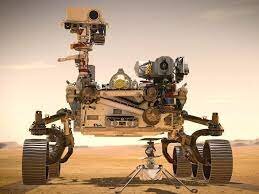Perseverance: A New Era of Space Travel
By Khushi Verma
https://www.businessinsider.com/how-nasa-perseverance-rover-will-land-on-mars-2021-2?r=US&IR=T
On the 18th of February 2021, NASA’s rover Perseverance landed on the surface of Mars, ready to search out signs of life on the Red planet. Perseverance is the first NASA mission to look for these "biosignatures" since the Viking missions in the 1970s. The aim of the robot is to hunt for signs of past microbial life on Mars, if it ever existed. The rover will collect samples of rock and soil and encase them in tubes. It will then leave them on the rocky surface of the planet, and they will be retrieved by Earth at a future date (scientists are estimating by 2031).
The rover also carries a helicopter named ‘Ingenuity’, which will be deployed to create the first powered flight on Mars. The helicopter can take colour images with a 13-megapixel camera, the same type found in smartphones. Helicopters could be a useful way to explore other worlds: flying vehicles travel faster than ground-based rovers and can reach areas that are inaccessible to wheeled vehicles. The plan is for Perseverance to search the Jezero Crater, a 49km crater just north of the planet’s equator for one Mars year (around 687 Earth days). More than 3.5 billion years ago, Jezero was a large lake, filled by overflowing river channels. The large bowl is also home to one of the best-preserved Martian examples of a delta, a sedimentary structure that forms when rivers enter open bodies of water and deposit rocks, sand and - potentially - organic carbon in layers. This data can be analysed to see if there were ever signs of life on Mars, which would be a huge milestone for mankind’s journey into space.
Today, Mars is cold and dry, with a thin atmosphere that allows intense cosmic radiation through. But, billions of years ago, the planet seems to have been wetter, with a thicker atmosphere. There is clear evidence that there was once water on Mars- scientists have found mudstones and sedimentary bands, a sign which only liquid water can leave. This is important because water is an essential ingredient for all life on Earth. Curiosity (another rover sent to Mars) also found organic molecules preserved in sedimentary rocks that were three billion years old. However, we cannot be sure whether these traces are from biological processes, or something completely different that we cannot decipher yet.
The planet of Mars is still a mystery, but the launching of the Mars rover means we are one step closer to solving it.
Sources: https://mars.nasa.gov/mars2020/ https://www.bbc.co.uk/news/science-environment-53129281
